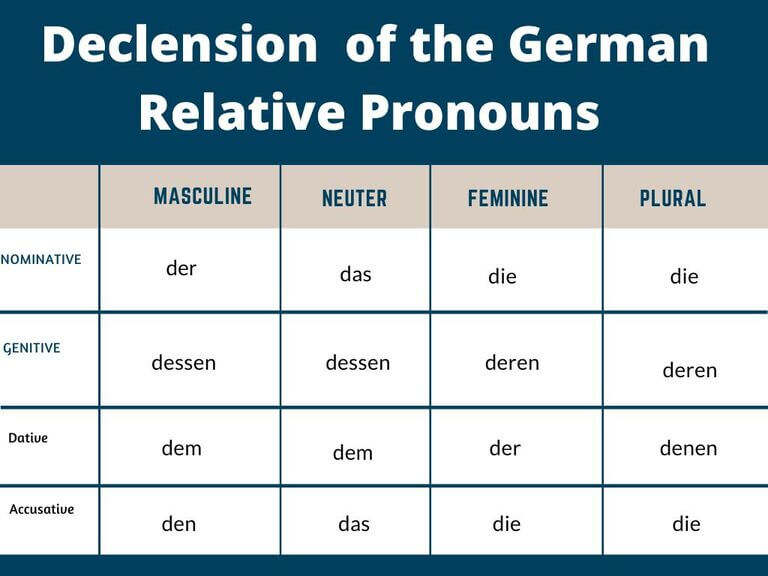Why Are Relative Clauses Important?
Relative clauses make sentences clearer and more natural by adding important details. They also help avoid repetition and improve sentence flow.
1. They Add Essential Information
Relative clauses give extra details without starting a new sentence.
Example:
- German: Der Mann, der eine Brille trägt, ist mein Lehrer.
- English: The man who wears glasses is my teacher.
2. They Help Avoid Repetition
They connect ideas smoothly, making sentences sound better.
Example:
- German: Ich habe einen Hund, der sehr verspielt ist.
- English: I have a dog that is very playful.
3. They Are Common in Formal & Everyday German
Native speakers use them in spoken and written German.
Example:
- German: Ich habe eine Frau getroffen, die fünf Sprachen spricht.
- English: I met a woman who speaks five languages.
Key Takeaway
Relative clauses make sentences more advanced, natural, and fluent in German. Learning them improves both speaking and writing.
What are Relative Clauses, and How to Use Them?
Relative clauses add information about a noun or pronoun mentioned in the main clause. They use relative pronouns that agree with the antecedent in gender, number, and case.
Example:
- German: Der Mann, der das Buch schreibt, heißt Tom.
- English: The man who writes the book is called Tom.
Relative Pronouns Overview

German has three genders: masculine, feminine, and neuter. Relative pronouns must match the gender and number of the noun they refer to.
German articles:
- Masculine: der
- Feminine/Plural: die
- Neuter: das
Want to learn more about German articles and gender? Read more: here.
Relative Clauses with Different Cases
The form of the relative pronoun depends on its case (nominative, genitive, dative, accusative). The case is determined by the role of the pronoun in the relative clause.
Nominative Case
The nominative case is used when the relative pronoun acts as the subject of the relative clause. In German, the nominative forms of relative pronouns are:
- Masculine: der
- Feminine: die
- Neuter: das
- Plural: die
How to Recognize the Nominative Case
The relative pronoun is in the nominative if it performs the action of the verb in the relative clause. You can check this by replacing it with a personal pronoun (he, she, it, they) and seeing if the sentence still makes sense.
Example Sentences (Nominative)
| German | English |
|---|---|
| Der Mann, der ins Kino geht, heißt Tom. | The man who goes to the cinema is called Tom. |
| Die Frau, die eine Handtasche hat, fährt mit dem Bus. | The woman who has a handbag takes the bus. |
| Das Kind, das 8 Jahre alt ist, geht zur Schule. | The child who is 8 years old goes to school. |
Genitive Case in German Relative Clauses
The genitive case is used to indicate possession or relationships between nouns. In relative clauses, the genitive relative pronouns are:
- Masculine / Neuter: dessen
- Feminine / Plural: deren
Genitive pronouns do not function as subjects or objects in the relative clause. Instead, they show ownership or association.
How to Recognize the Genitive Case
A relative pronoun in the genitive answers the question “whose?”
It typically appears before the noun it modifies and shows that something belongs to the antecedent.
Example Sentences (Genitive)
| German | English |
|---|---|
| Der Mann, dessen Auto schnell fährt, ist Anwalt. | The man whose car drives fast is a lawyer. |
| Die Frau, deren Haus schön ist, lebt in Köln. | The woman whose house is nice lives in Cologne. |
| Das Kind, deren Freunde die gleiche Schule besuchen, treibt Sport. | The child whose friends attend the same school likes sports. |
Dative Case in German Relative Clauses
The dative case is needed in relative clauses when the relative pronoun functions as an indirect object or when it follows a dative preposition. Unlike nominative and accusative pronouns, dative relative pronouns indicate relationships between people or things.
Dative Relative Pronouns
- Masculine / Neuter: dem (to/for whom, with which)
- Feminine: der (to/for whom, with which)
- Plural: denen (to/for whom, with which)
When to Use the Dative Case
A relative pronoun in the dative typically follows:
- Dative prepositions (e.g., mit, nach, zu, von, bei, seit)
- Verbs that require a dative object (e.g., helfen, danken, gehören)
Example Sentences (Dative)
| German | English |
|---|---|
| Der Kollege, mit dem du arbeitest, heißt Tim. | The colleague you work with is called Tim. |
| Die Studentin, mit der du ins Kino gehst, reist gern. | The student you go to the cinema with likes to travel. |
| Die Freunde, mit denen wir sprechen, sind freundlich. | The friends we speak with are friendly. |
Accusative Case in German Relative Clauses
The accusative case appears in relative clauses when the relative pronoun functions as a direct object. The verb in the relative clause determines whether the pronoun takes the accusative case.
Accusative Relative Pronouns
- Masculine: den (whom, which)
- Feminine / Plural: die (whom, which)
- Neuter: das (which)
When the Accusative Case is Needed
A relative pronoun in the accusative is required when:
- The verb in the relative clause needs a direct object (e.g., sehen, kennen, lesen, lieben, kaufen).
- Accusative prepositions (e.g für, ohne, bis)
Example Sentences (Accusative)
| German | English |
|---|---|
| Der Student, den du siehst, studiert Medizin. | The student you see studies medicine. |
| Die Frau, die ich kenne, wohnt in Berlin. | The woman I know lives in Berlin. |
| Das Buch, das du liest, ist interessant. | The book you are reading is interesting. |
How to Build a German Relative Clause
A relative clause is a subordinate clause that provides more information about a noun. The verb always goes to the end of the relative clause. If a preposition is used, it comes before the relative pronoun.
Example Sentences:
- German: Der Mann, der nach Hause geht, isst Eis.
- English: The man who goes home eats ice cream.
- German: Die Frau, die du siehst, heißt Tina.
- English: The woman you see is called Tina
German Relative Clauses with Prepositions
In relative clauses with prepositions, the relative pronoun still matches the noun in gender and number, but the preposition moves before the pronoun.
Example Sentences:
- German: Das Auto, mit dem der Mann fährt, ist teuer.
- English: The car with which the man drives is expensive.
- German: Das Haus, in dem wir wohnen, ist groß.
- English: The house in which we live is big.
Relative Pronouns with wo, wohin, woher
Use “wo” to indicate where something is located, “wohin” to show where something is going, and “woher” to show where something is coming from. These forms can also introduce relative clauses that provide location or direction information.
Example Sentences (wo, wohin, woher)
| German | English |
|---|---|
| Der Ort, wo ich lebe, ist sehr ruhig. | The place where I live is very quiet. |
| Die Stadt, wohin wir reisen, ist wunderschön. | The city to which we are traveling is beautiful. |
| Das Dorf, woher er kommt, ist klein. | The village from which he comes is small. |
Relative Pronouns with wer, wem, wen
“Wer” (who – nominative), “wem” (whom – dative), and “wen” (whom – accusative) refer mostly to people. They help indicate the case based on the pronoun’s role in the clause.
“Wer” is the subject (nominative). “Wem” indicates an indirect object (dative), and “wen” indicates a direct object (accusative).
Example Sentences (wer, wem, wen)
| German | English |
|---|---|
| Ich frage mich, wer kommt. | I wonder who is coming. |
| Die Frau fragt den Mann, wem er hilft. | The woman asks the man whom he is helping. |
| Der Junge fragt das Mädchen, wen sie einlädt. | The boy asks the girl whom she invites. |
Relative Pronouns with was
“Was” stands for “what” and often refers to things, ideas, or entire clauses, not people. It can introduce a relative clause that gives more details about something non-human.
Example Sentences (was)
| German | English |
|---|---|
| Das, was mir gefällt, ist Reisen. | What pleases me is traveling. |
| Alles, was du brauchst, ist Geduld. | All that you need is patience. |
| Das, was er sagte, war interessant. | What he said was interesting. |
German Relative Clauses in Passive
Relative clauses can appear in the passive voice. The main difference is the placement of the participle and the auxiliary verb “werden” at the end of the clause. The relative pronoun still agrees with its antecedent, and the sentence structure remains that of a subordinate clause.
- Aktiv: Das Haus, das der Bauarbeiter baut, ist groß. (Active: The house that the worker builds is big.)
- Passiv: Das Haus, das von dem Bauarbeiter gebaut wird, ist groß. (Passive: The house that is being built by the worker is big.)
In the passive relative clause, “gebaut” (the past participle) and “wird” (the auxiliary) appear at the end. This pattern is consistent with other German subordinate clauses in the passive.
Example Sentences (Passive)
| German | English |
|---|---|
| Der Brief, der von der Sekretärin geschrieben wird, ist wichtig. | The letter that is being written by the secretary is important. |
| Die Brücke, die von den Arbeitern repariert wird, ist alt. | The bridge that is being repaired by the workers is old. |
| Das Bild, das von dem Künstler gemalt wird, ist schön. | The picture that is being painted by the artist is beautiful. |
German Relative Clauses Quiz
Test your knowledge with of relative clauses with our Quiz here.
Common Mistakes with German Relative Clauses
Many learners struggle with relative clauses in German. The most common mistakes involve incorrect case selection, word order, and the wrong relative pronoun. Below are key errors and how to fix them.
1. Using the Wrong Case for the Relative Pronoun
The case of the relative pronoun depends on its function in the relative clause, not the main clause.
✅ Correct:
- Der Mann, den ich sehe, ist mein Lehrer. (The man whom I see is my teacher.) → “den” (accusative) because “ich sehe” needs an accusative object.
❌ Incorrect:
- Der Mann, der ich sehe, ist mein Lehrer. (Wrong: “der” is nominative, but “ich sehe” requires accusative.)
2. Incorrect Word Order in the Relative Clause
In German relative clauses, the verb must always go to the end.
✅ Correct:
- Das Buch, das du mir gegeben hast, ist sehr interessant. (The book that you gave me is very interesting.)
❌ Incorrect:
- Das Buch, das du hast mir gegeben, ist sehr interessant. (Wrong: “hast” should be at the end.)
3. Using “Was” Instead of “Der/Die/Das”
The relative pronoun “was” is only used when referring to indefinite words like alles, nichts, etwas or an entire sentence.
✅ Correct:
- Alles, was du sagst, ist wahr. (Everything that you say is true.)
- Das Beste, was ich je gehört habe, war dieses Lied. (The best thing that I ever heard was this song.)
❌ Incorrect:
- Das Buch, was ich lese, ist spannend. (Wrong: “das” should be used instead of “was” because “Buch” is a specific noun.)
How to Avoid These Mistakes?
- Always identify the case of the relative pronoun by looking at its function in the relative clause.
- Remember that the verb always goes at the end of the clause.
- Use “was” only with indefinite words, not specific nouns.
Easy Tricks to Master German Relative Clauses
Mastering German relative clauses is easier when you follow a few simple rules. These tricks will help you avoid mistakes and use relative clauses naturally.
1. Identify the Antecedent First
Before choosing a relative pronoun, find the noun it refers to. The pronoun must match this noun in gender and number, but the case depends on its role in the relative clause.
Example:
- Der Mann, der ein Buch liest, ist mein Lehrer. (The man who is reading a book is my teacher.)
- Die Frau, die du kennst, wohnt in Berlin. (The woman whom you know lives in Berlin.)
2. Learn the Fixed Relative Pronouns
Most relative clauses use der, die, das based on the noun’s gender. If the relative clause comes with a preposition, place it before the relative pronoun.
Example:
- Das Auto, mit dem ich fahre, ist neu. (The car with which I drive is new.)
- Die Stadt, in der ich wohne, ist groß. (The city in which I live is big.)
3. Remember That the Verb Always Goes at the End
In German relative clauses, the verb is always placed at the end.
Example:
- Der Junge, den ich gestern getroffen habe, spielt Fußball. (The boy whom I met yesterday plays soccer.)
- Das Buch, das du mir gegeben hast, ist sehr interessant. (The book that you gave me is very interesting.)
Use “Was” Only for Indefinite Pronouns
Use was instead of der, die, das when referring to words like alles, etwas, nichts or an entire sentence.
Example:
- Alles, was du sagst, ist wichtig. (Everything that you say is important.)
- Das Beste, was mir passiert ist, war der Urlaub. (The best thing that happened to me was the vacation.)
Keep Sentences Short When Possible
Long relative clauses can be confusing. If a sentence feels too complex, split it into two sentences or use a simpler structure.
Example:
- Statt: Der Mann, der in einem großen Haus am See wohnt, ist mein Onkel.
- Leichter: Der Mann wohnt in einem großen Haus am See. Er ist mein Onkel.
Conclusion
German relative clauses help add detail and clarity. By choosing the correct relative pronoun and placing the verb at the end, you create more precise statements. Practicing these forms and exploring alternatives like adjective or participle phrases will improve your fluency.
FAQ
Do I always put the verb at the end of a relative clause?
Yes. Relative clauses are subordinate clauses, and the verb typically goes at the end.
How do I pick the correct relative pronoun?
Choose based on the gender, number, and case of the antecedent and the role it plays in the relative clause.
Can I use “was” for persons?
Usually “was” refers to things, ideas, or concepts, not persons.
Are genitive relative clauses common?
They exist, but speakers often avoid them and use other structures.
What are alternatives to relative clauses?
Instead of a relative clause, you can use adjectives or participle phrases for a more concise sentence. For example:
- Relative clause: Das Haus, das groß ist, ist schön.
- Alternative: Das große Haus ist schön.
- Relative clause: Das Haus, das die Frau gekauft hat, ist schön.
- Alternative: Das von der Frau gekaufte Haus ist schön.
How can I improve my use of relative clauses?
Practice with sentences, review these tables, and take quizzes. Over time, you will use them more naturally.


